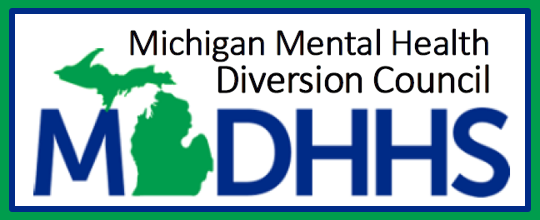Assisted outpatient treatment (AOT) and law enforcement
Tuesday, January 10, 2023
10:00 am - 11:00 am
What role do law enforcement agencies and officers play in AOT orders? Since AOT (also known as Kevin's Law) is a civil order, what are the responsibilities of officers regarding transport orders? How does AOT fit with Crisis Intervention Team (CIT) training and other crisis response police work? Join us for a conversation with retired Deputy Chief Jim Grafton of Calhoun County and Sergeant Greg Howard of Genesee County to learn about their county's experience with AOT. This informative discussion was led by Scott Smith, Ph.D., and answered questions about AOT in real life practice.
Speakers

Deputy Chief Jim Grafton
Deputy Chief (ret.),
Calhoun County Sheriff's Office
Law Enforcement Liaison and CIT Co-Coordinator,
Summit Pointe

Sgt. Greg Howard
Sergeant,
Genesee County Sheriff's Office

Facilitated by:
Scott Smith, Ph.D.
Law enforcement consultant,
Center for Behavioral Health and Justice
Question and answer
Thank you to our attendees for asking several excellent questions. Below are the answers to questions questions we didn't get time to answer during the webinar.
- AOT programs, services, and benefits
What would you say you perceive as the greatest benefit of AOTs for LEOs?
It helps free up their time to focus on public safety instead of mental health treatment.Are all counties in Michigan on the same AOT program?
AOT is a court order and the laws that govern AOT apply statewide. Individual counties may develop AOT programs. Also, the contents of the AOT order and services prescribed are unique to the individual.The mental health programs individuals can go to for AOT, are they private agencies or government agencies?
Depending upon the services included in an AOT order, the client may need to go to Community Mental Health (CMH) or CMH contracted providers for services, as they are often not available from private providers. One example of this would be an Assertive Community Treatment (ACT) service.What efforts have, are, and will the AOT's do to be advocates for improvement of the overall mental health services?
Because of the growing mental health crisis, much more awareness of problems within the mental health treatment system has occurred on all levels. We are cautiously optimistic that current efforts on the state and national level will improve mental health treatment delivery, especially focused on recovery support, so that people living with mental illness can live the fullest life possible, instead of moving from episode to episode. AOT is one mechanism to hold individuals and providers accountable for mental health treatment. Additional materials can be found in the families and advocates section of the toolkit. - Transport orders
We get a significant number of Mental Health pick up Orders for individuals who are compliant and have adequate transportation means with either their AFC home or guardian. Is there a reason that Law Enforcement has to get involved?
A transport order is issued by a judge when there is compelling evidence that an individual has become non-compliant with their treatment and needs to be taken to a treatment facility to be evaluated. Often, the person living with serious mental illness (SMI) will change their perception of needing treatment when law enforcement is present. Since the transport order is an order issued by the judge, law enforcement should comply with the order and work with the courts to determine if there are alternate strategies to utilize in the future.Have you encountered any departments or Sherrifs' Offices who are hesitant to participate in protective custody transports related to AOT?
As AOT is being rolled out, there are changes to the mental health code law that may require SOPs to be updated to comply with the changes in law.Does a pathway exist to pick up and transport a person due to a substantial substance use disorder type problem? An example would be a person who has multiple contacts with law enforcement and EMS due to overdosing with Narcan use.
Unless the person also has a mental health diagnosis, an AOT cannot be initiated only for substance use. - Program adherence
How is attendance to an AOT program enforced?
Best practice is to make the case manager aware of non-adherence to treatment so that the treatment team can try to address the issue with the person. If that is ineffective, a notice of non-compliance is filed with the court.When released from Hospital to AOT with CMH, who is it that has responsibility to make sure AOT is being complied with?
The court handles enforcement and the mental health treatment provider handles monitoring adherence and progress toward treatment goals. Ideally, concerned parties should reach out to the person's case manager if concerned about lack of adherence so it can be properly addressed. - Co-response/co-responder programs
What are the initial barriers to a community wanting to establish a co-responder program?
Co-responder programs are separate from AOT programs (although AOT does rely on multiple systems within a community) so co-response teams may respond to a situation for a person with an AOT.When a co-responder team arrives how are individuals who have an AOT who also present as under the influence managed?
The situation is managed the same as any co-response regardless of AOT status.
Do you have more questions about assisted outpatient treatment orders and law enforcement? Visit the FAQ page to ask your question.
